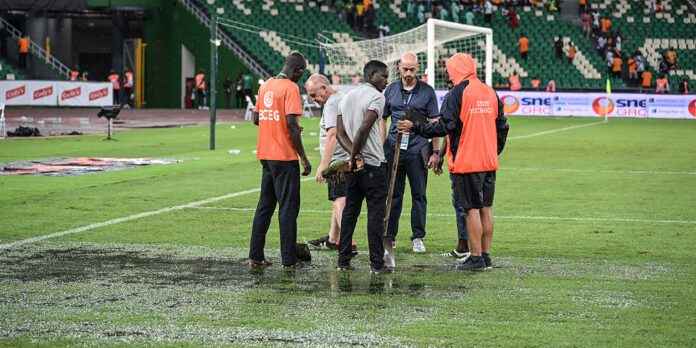“Fortunately it was just a friendly and not a qualifying match for the CAN or the World Cup, which would have to be completely repeated or ended”, jokes a person close to the Ivory Coast team. In Côte d'Ivoire, however, no one wants to laugh the day after the new fiasco at the Alassane-Ouattara stadium, in Ebimpé, about 25 kilometers north of Abidjan.
Tuesday, September 12, the Elephants of Côte d'Ivoire received as the Eagles of Mali, also skills for the final phase of the African Cup of Nations (CAN) 2024, for a friendly game in this new venue with 60 thousand seats, paid and built by China. At forty-five minutes, when the score was 0-0, the Togolese judge, Gnama Aklesso, interrupted the game because of the torrential rain and the condition of the field, which became impassable after the training impressive puddles in several places. Enough to provoke countless provocations and criticisms on social media, where images quickly circulated of the ball unable to bounce on a wet field.
Tattered Lawn
According to a note released by the National Sports Secretariat (ONS), the drainage system and the leveling of the lawn could be one of the causes of these floods. “This transport system seems inadequate because it is very slow in case of heavy rain, as happened on Tuesday night. [le 12 septembre]. But if we change the moving system, we have to change the pitch”, explains a source who knows the subject well.
A viable technical hypothesis, but which excludes calendar restrictions. CAN 2024 should actually start on January 13th, with an opening match… at the Ebimpé stadium. However, the installation of a new relief is necessarily subject to the approval of a budget and a competition to designate the company responsible for the operation. All this takes time that the Ivorian authorities do not necessarily have, four months before the start of the competition. Contacted by Young Africa, Paulin Claude Danho, Minister of Sports, and François Amichia, president of the CAN organizing committee (COCAN), did not respond to our requests.
Opened on October 3, 2020 during a match between ASEC Mimosas and Africa Sports, the two main clubs in Abidjan, the Alassane-Ouattara stadium was closed in November 2021 after the Ivory Coast vs. Cameroon World Cup qualifier match 2022, where the field was in shambles. An unprecedented measure that forced the Ivorian Football Federation (FIF) to request Benin's hospitality to play their last qualifying games in Cotonou. Since then, the Elephants have hosted Zambia in Yamoussoukro, Comoros in Bouaké and Lesotho in San-Pedro for the CAN 2024 qualifiers.
Difficult to access stadium
The State of Côte d'Ivoire paid in full the bill for replacing the Ebimpé playing area, with the installation of a new hybrid lawn, but also for its adaptation to FIFA standards (namely in the changing rooms and electricity), or a total of almost 30 million euros. A narrative that made some people shudder and gave an additional argument to those who do not miss the opportunity to note that the new stadium named after the Head of State, in addition to being a financial pit, is difficult to access.
The matter is now being monitored very closely by Alassane Ouattara and the directors of the Confederation of African Football (CAF). In addition to the opening match, the Ebimpé stadium is expected to host several CAN matches, including a semi-final and a final.
At the end of this Wednesday's council of ministers, Amadou Coulibaly, government spokesman, returned to the incidents of the day before. “I don’t see how there would be assessments to be made for a natural event,” he declared, referring to the “adjustments to be made” to the stadium.
According to information from young Africa, Mariam Yoda, director general of the ONS, would be greatly weakened by this case. This would not necessarily be the case for Paulin Claude Danho, who has just been re-elected president of the Chamber of the Attécoubé commune, in the district of Abidjan. “Politically, it seems difficult to remove the minister from his duties”, explains a source close to the there FIF.

